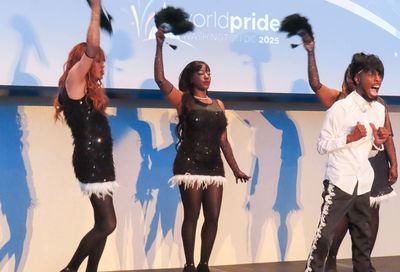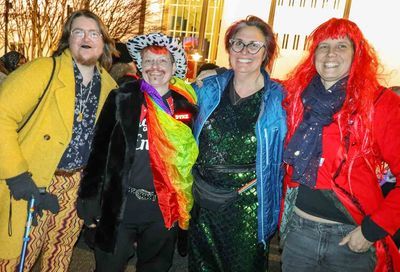Supreme Court rules Colorado baker has a right to refuse to serve gay couple
High court refrains from specifying how religious exemptions are to be shaped or how extensive they must be

On Monday, the U.S. Supreme Court ruled that a Colorado baker has the legal right to refuse to make a wedding cake for a gay couple because of his own objections to same-sex marriage. But the nation’s highest court essentially punted when it came to deciding how broad or narrow such an exemption should be in order to balance religious objections with the right of LGBTQ people not to be discriminated against.
The justices ruled 7-2 in favor of Jack Phillips, the owner of Masterpiece Cakeshop in Lakewood, Colo., with those in the majority saying that they believed the Colorado Civil Rights Commission had not taken Phillips’ concerns about violating his religious beliefs seriously.
Justice Anthony Kennedy, who penned the majority opinion, particularly focused on comments made by a commissioner after the commission had heard the case that appeared to indicate a belief that people have used “freedom of religion” as an attempt to justify discrimination, slavery, and even the Holocaust.
Kennedy, a conservative Catholic, took umbrage at the commissioner’s remarks, saying this train of thought showed a hostility to those with sincere religious beliefs and may have biased the commission’s decision. The commission had previously found that Phillips violated Colorado civil rights law when he turned away Charlie Craig and David Mullins because they were in a same-sex relationship.
“The neutral and respectful consideration to which Phillips was entitled was compromised here,” Justice Kennedy wrote for the majority. “The Civil Rights Commission’s treatment of his case has some elements of a clear and impermissible hostility toward the sincere religious beliefs that motivated his objection.”
Because the decision revolved largely around the commission’s alleged “hostility” to Phillips’ moral dilemma and the specific facts in the Masterpiece case, the Supreme Court did not resolve many of the key questions surrounding First Amendment issues. As such, even though the court acknowledges there should be some type of exemption for business owners with sincere religious objections, it declined to elaborate on how tailored or robust such an exemption would have to be in order to avoid violating a business owner’s right to free speech and freedom of religion.
Additionally, the court also acknowledged that the government may have some type of vested interest in ensuring that LGBTQ people are not blatantly discriminated against, meaning that similar cases with a different set of facts may be decided differently.
“The outcome of cases like this in other circumstances must await further elaboration in the courts, all in the context of recognizing that these disputes must be resolved with tolerance, without undue disrespect to sincere religious beliefs, and without subjecting gay persons to indignities when they seek goods and services in an open market,” Kennedy concluded.
In a concurring opinion, Justices Elena Kagan and Stephen Breyer argued that they believe the commissioners were motivated to some extent by biases. But they also note that an impartial decision could have been reached that would have established that same-sex couples have the right to be protected from discrimination.
Kagan and Breyer noted that the Colorado Civil Rights Commission had reached a different conclusion in three other cases where a man named William Jack had gone around to local bakeries and asked them to make “cakes with images that conveyed disapproval of same-sex marriage, along with religious text.” But the two liberal justices argue there was already a proper basis for distinguishing between the Jack cases and Phillips’ case: namely, that the three bakers in the Jack cases did not violate the law.
“Jack requested them to make a cake (one denigrating gay people and same-sex marriage) that they would not have made for any customer. In refusing that request, the bakers did not single out Jack because of his religion, but instead treated him in the same way they would have treated anyone else — just as CADA requires,” writes Kagan.
“By contrast, the same-sex couple in this case requested a wedding cake that Phillips would have made for an opposite-sex couple. In refusing that request, Phillips contravened CADA’s demand that customers receive ‘the full and equal enjoyment’ of public accommodations irrespective of their sexual orientation,” she adds. “The different outcomes in the Jack cases and the Phillips case could thus have been justified by a plain reading and neutral application of Colorado law — untainted by any bias against a religious belief.
“Colorado law, the Court says, ‘can protect gay persons, just as it can protect other classes of individuals, in acquiring whatever products and services they choose on the same terms and conditions as are offered to other members of the public,'” Kagan adds. “For that reason, Colorado can treat a baker who discriminates based on sexual orientation differently from a baker who does not discriminate on that or any other prohibited ground. But only, as the Court rightly says, if the State’s decisions are not infected by religious hostility or bias. I accordingly concur.”
Going forward, the court’s decision essentially opens the floodgates for future litigation involving conflicts between people’s religious beliefs and a desire to prohibit discrimination against a minority group, leaving local, state and federal courts to find their own solutions . Many court observers expect the Supreme Court will be forced to take up a similar case — this one involving a florist in Washington State who refused to provide flowers for a same-sex wedding — to carve out and clearly define what is considered an appropriate religious exemption.
LGBTQ groups were skeptical of the decision, noting that, while it is narrow and specific only to Masterpiece, it may encourage individuals or businesses with anti-gay animus to willfully flout non-discrimination laws across the country.
“The Court today has offered dangerous encouragement to those who would deny civil rights to LGBT people and people living with HIV,” Rachel B. Tiven, the CEO of Lambda Legal, said in a statement.
“Religious freedom under our Constitution has always meant the right to believe whatever you wish but not to act on your beliefs in ways that harm others. The Court today alarmingly fails to heed that distinction,” Tiven added. “Lambda Legal will continue to fight the establishment of evangelical Christianity as the official government religion. We will fiercely resist the coming effort that will seek to turn this ruling into a broad license to discriminate.”
Prior to the decision, equality advocates had noted that, if the court narrowly ruled in favor of Phillips, more conservative state legislatures may take it upon themselves to define what a “reasonable” religious exemption looks like in order to push the courts into following — and even endorsing — a particular legal rationale that allows certain parties to discriminate.
For example, a court or legislature could extend a blanket exemption for wedding-related businesses that allows them to turn away LGBTQ patrons, whereas the same exemption might not be extended to other businesses that don’t directly deal with marriage.
The Campaign for Southern Equality, which advocates for LGBTQ rights, noted the narrow scope of the decision, writing in a statement: “The Court did not rule that there is a right to discriminate: this ruling does not apply to businesses in other states and does not invalidate non-discrimination laws that protect LGBTQ people.”
But the Campaign for Southern Equality also noted that the Supreme Court failed to address the fundamental question of whether LGBTQ people have a right to be protected from discrimination in public accommodations, even though it believes that the court will decide that such a right exists.
“Here in the South, we see daily evidence of the growing support for LGBTQ equality, even as we continue to face discriminatory laws,” the Rev. Jasmine Beach-Ferrara, the group’s executive director, said in a statement. “We will continue to fight for full equality — and nothing less.”
Support Metro Weekly’s Journalism
These are challenging times for news organizations. And yet it’s crucial we stay active and provide vital resources and information to both our local readers and the world. So won’t you please take a moment and consider supporting Metro Weekly with a membership? For as little as $5 a month, you can help ensure Metro Weekly magazine and MetroWeekly.com remain free, viable resources as we provide the best, most diverse, culturally-resonant LGBTQ coverage in both the D.C. region and around the world. Memberships come with exclusive perks and discounts, your own personal digital delivery of each week’s magazine (and an archive), access to our Member's Lounge when it launches this fall, and exclusive members-only items like Metro Weekly Membership Mugs and Tote Bags! Check out all our membership levels here and please join us today!






















You must be logged in to post a comment.